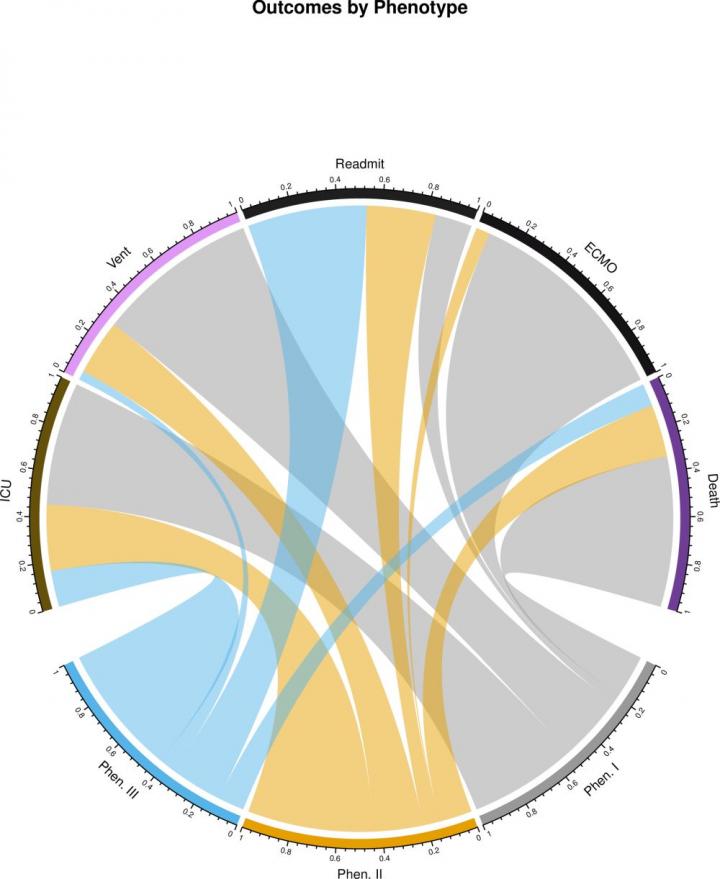Phenotypes I, II and III show distinct characteristics and show adverse, normal and favorable clinical outcomes respectively

Credit: Lusczek et al, 2021, PLOS ONE (CC-BY 4.0, https://creativecommons.org/licenses/by/4.0/)
In a new study, researchers identify three clinical COVID-19 phenotypes, reflecting patient populations with different comorbidities, complications and clinical outcomes. The three phenotypes are described in a paper published this week in the open-access journal PLOS ONE 1st authors Elizabeth Lusczek and Nicholas Ingraham of University of Minnesota Medical School, US, and colleagues.
COVID-19 has infected more than 18 million people and led to more than 700,000 deaths around the world. Emergency department presentation varies widely, suggesting that distinct clinical phenotypes exist and, importantly, that these distinct phenotypic presentations may respond differently to treatment.
In the new study, researchers analyzed electronic health records (EHRs) from 14 hospitals in the midwestern United States and from 60 primary care clinics in the state of Minnesota. Data were available for 7,538 patients with PCR-confirmed COVID-19 between March 7 and August 25, 2020; 1,022 of these patients required hospital admission and were included in the study. Data on each patient included comorbidities, medications, lab values, clinic visits, hospital admission information, and patient demographics.
Most patients included in the study (613 patients, or 60 percent) presented with what the researchers dubbed “phenotype II.” 236 patients (23.1 percent) presented with “phenotype I,” or the “Adverse phenotype,” which was associated with the worst clinical outcomes; these patients had the highest level of hematologic, renal and cardiac comorbidities (all p
The authors conclude that phenotype-specific medical care could improve COVID-19 outcomes, and suggest that future research is needed to determine the utility of these findings in clinical practice.
The authors add: “Patients do not suffer from COVID-19 in a uniform matter. By identifying similarly affected groups, we not only improve our understanding of the disease process, but this enables us to precisely target future interventions to the highest risk patients.”
###
Citation: Lusczek ER, Ingraham NE, Karam BS, Proper J, Siegel L, Helgeson ES, et al. (2021) Characterizing COVID-19 clinical phenotypes and associated comorbidities and complication profiles. PLoS ONE 16(3): e0248956. https:/
Funding: 1. NIH National Heart, Lung, and Blood Institute T32HL07741 (NEI) 2. This research was supported by the Agency for Healthcare Research and Quality (AHRQ) and Patient-Centered Outcomes Research Institute (PCORI), grant K12HS026379 (CJT) and the National Institutes of Health’s National Center for Advancing Translational Sciences, grant UL1TR002494. 3. NIH National Heart, Lung, and Blood Institute T32HL129956 (JP, LS) The funders had no role in study design, data collection and analysis, decision to publish, or preparation of the manuscript.
Competing Interests: The authors have declared that no competing interests exist.
In your coverage please use this URL to provide access to the freely available article in PLOS ONE: https:/
Media Contact
Angeleigha Mendez
[email protected]
Related Journal Article
http://dx.




